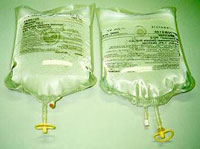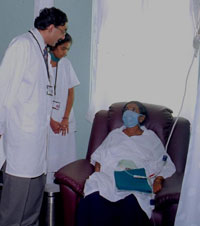Peritoneal dialysis

When end-stage renal failure occurs (that is, when the kidney function is irreversibly reduced to below 15% of normal), there are two treatment options: dialysis or a kidney transplant (also known as a renal transplant).
There are two types of dialysis: Haemodialysis and Peritoneal dialysis. This page deals with Peritoneal dialysis. In Peritoneal dialysis, the patient’s Peritoneum (membrane present inside the abdomen) is used for the purpose of dialysis. Peritoneal dialysis occurs within the patient’s body itself.
For Peritoneal dialysis, a tube called a catheter is surgically placed through the wall of the patient’s abdomen as permanent access for Peritoneal dialysis. The catheter is usually placed about an inch below and to the side of the navel. About 2-4 inches of the catheter extends out of the body.
Through the catheter, the Peritoneum is filled with Peritoneal dialysate (fluid with chemicals that help to remove wastes from the body). The dialysate absorbs excess water and waste products. The dialysate remains in the Peritoneum for a certain period of time. This is known as dwell time. After this period, the solution, along with the wastes, is drained from the abdomen into a sterile collection bag.
Peritoneal dialysis is of the following types:
- Intermittent Peritoneal Dialysis (IPD): Intermittent Peritoneal dialysis is offered to patients on a temporary basis when their blood pressure is low or in children with Acute Renal Failure to tide over a crisis. It is performed for a short period of 24-48 hours.
- Continuous Ambulatory Peritoneal Dialysis (CAPD): In CAPD, the patient’s Peritoneum is manually filled by hand with the dialysate and there are no dry periods.
- Automated Peritoneal Dialysis (APD): APD is performed through a cycler machine. It is performed during the night when the patient is asleep.
- Continuous Cyclic Peritoneal Dialysis (CCPD): In CCPD, the patient’s Peritoneum is filled with the dialysate by a machine at night and the exchanges are carried out throughout the night. As the patient is not attached to the machine during the day, it enables the patient to be more mobile during the day.
- Daytime Ambulatory Peritoneal Dialysis (DAPD): In DAPD, the patient’s peritoneum is filled with the dialysate during the day and it is dry at night.
- Night-time Intermittent Peritoneal Dialysis (NIPD): In NIPD, the patient’s peritoneal cavity is filled with the dialysate manually or with a cycle at night and it is dry during the day.
CAPD Centre

NU Hospitals, in collaboration with Baxter, has set up a CAPD center with a
coordinator trained in CAPD manning the center.
At the center, patients are initiated on CAPD. Patients and their attendees are
also educated regarding the procedure, hygiene, etc. Counseling about the
various options available for patients with end-stage renal disease is also
done. The center also possesses a cycler machine that enables patients to
undergo CCPD when required. This process is completely automated.